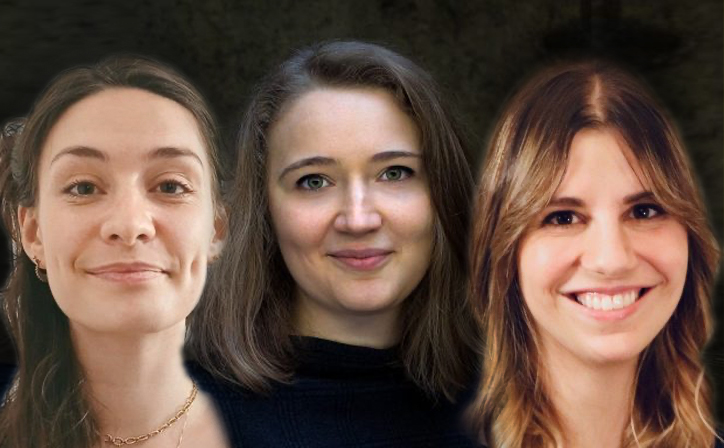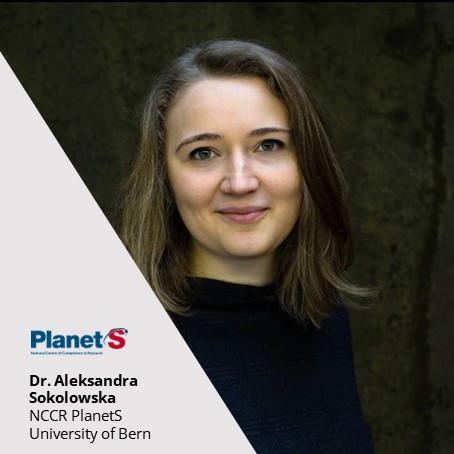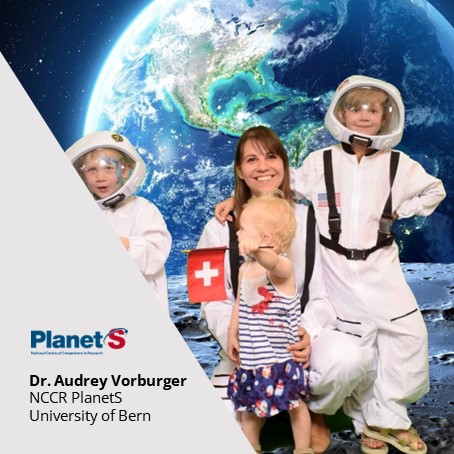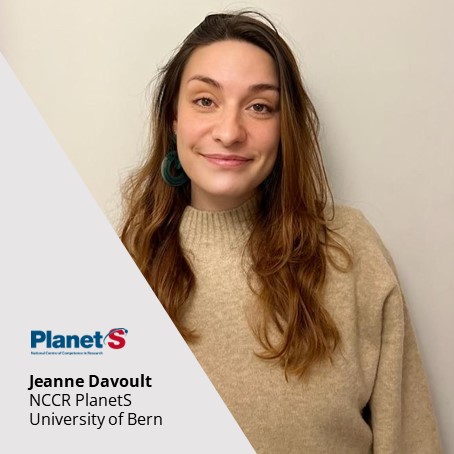Second #NCCRWomen campaign

Last November, the second #NCCRWomen campaign started, featuring again scientists from the NCCR PlanetS! #NCCRWomen is an initiative launched for the 50th anniversary of women’s right to vote in Switzerland (7th of February 1971). It puts under the spotlight, women from each NCCR, sharing their portrait on a dedicated Twitter account, looking back at their inspirations, their experience of the research world, as well as their aspirations for the future. Aleksandra Sokolowska, Audrey Vorburger and Jeanne Davoult represented the NCCR PlanetS in December 2022 for this new campaign.
Aleksandra Sokolowska
 I am a Scientific Researcher at the Planetary Imaging Group (PIG) at the University of Bern. These days I am particularly interested in what ejecta of impact craters can tell us about the past and present conditions on Mars, which requires combining remote sensing data and impact simulations. Before I joined NCCR PlanetS, I worked outside academia in various tech roles, and founded an educational non-profit focusing on tech and leadership skills called women++. But, to quote Jeffrey McDonnel, “freedom, of research topics, travel destinations, is a drug”. Perhaps this is why I did 2 things which are quite uncommon: I came back to space sciences ~4 years after my PhD, and I switched fields.
I am a Scientific Researcher at the Planetary Imaging Group (PIG) at the University of Bern. These days I am particularly interested in what ejecta of impact craters can tell us about the past and present conditions on Mars, which requires combining remote sensing data and impact simulations. Before I joined NCCR PlanetS, I worked outside academia in various tech roles, and founded an educational non-profit focusing on tech and leadership skills called women++. But, to quote Jeffrey McDonnel, “freedom, of research topics, travel destinations, is a drug”. Perhaps this is why I did 2 things which are quite uncommon: I came back to space sciences ~4 years after my PhD, and I switched fields.
As a grad student, I was admitted to a special program called Fast Track PhD at the University of Zurich, which accelerated my PhD. I studied the formation of galaxies and their hot gas in the cosmic web but at some point I wanted to venture out of this niche and explore more. So I zoomed out, combed through textbooks in search of inspiration, and found the surface processes on Mars to be particularly interesting. However, at the time I was neither knowledgeable, nor bold enough to manage such a drastic switch and to obtain a postdoc position outside my field of expertise, where on top of that I knew no one. Only years later, and completely by chance, something happened that empowered me to go against all odds: I got a research job in yet a different field, I wrote my first proposal kind of for fun, and ended up on a waiting list to get funded.
This was a pivotal moment for me because it gave me a reason to believe that I was wrong about not having a chance to work in planetary sciences; I just needed to try harder. After some years of working in different countries and always taking on new kinds of challenges, I was also much more certain of my abilities, more determined, and knew how to work smarter. Hence, I dropped everything and focused on studying Martian geomorphology. I’ve also decided to get my own funding to do exactly what fascinates me rather than to try to join someone else’s work, thinking that it would give me the experience and freedom needed to pick the right job (and research topic) in the future. And so, thanks to the short-term funding from NCCR PlanetS Reserve and the University of Bern’s Initiator Grant, I was able to work on my first project. Meanwhile, I was applying for jobs and prestigious fellowships, one of which resulted in the Seal of Excellence from the Marie Sklodowska-Curie program. Today I am extremely happy because I will be working as a postdoctoral researcher at Brown University, on two kinds of surface processes on Mars.
I think that my younger self should know that in academia, which is rewarding hyper-achieving persons, it isn’t uncommon to lose touch with a deeper self. In addition, perfectionism, which is so prevalent among women due to gender socialization, is putting us at risk of being less assertive and more self-deprecatory, outspokenly or not. These glitches in the system let the talent fall through the cracks. This is why I founded women++, why I take the opportunities to lift people up, and why I am forever grateful to those who did the same for me when I needed it.
Audrey Vorburger
Like many of us, I was fascinated by space from an early age. However, I did not think there was a realistic chance of pursuing such a career in Switzerland. Therefore, after high school I went to ETH to study electrical and information engineering, a field that seemed to offer many exciting job opportunities. During my four and a half years at ETH, however, I kept being drawn to space exploration, so I took a leap of faith and applied for a PhD position in space science at the University of Bern. 14 years and three children later, there is not a single day that I regret completely changing the direction of my work.
Although I have never regretted the career path I chose, I can’t say it has always been easy. For the compulsory postdoc position, my husband and I had to move abroad for a year and a half with a one-year-old child. My work as a space scientist required extensive international travel – from America to the North of Sweden and the South of India -, and still does, which is not always easy for the family, either. But when you see the excitement in your children’s faces when you tell them about your work, or when you are invited to join two European Space Agency committees to discuss ESA’s next flagship mission or Europe’s future plans for human and robotic exploration of the Moon and Mars, those are moments that give you renewed momentum to push onward. To space and beyond 😉
Jeanne Davoult
I always wanted to study physics and astrophysics came up in high school. So naturally I did a bachelor’s degree in physics and mathematics. Then I did a first year master’s degree in astrophysics at the Paris Observatory. At the end of this first year we were asked to specialise.
So beyond the passion for the subject that was immediate, my choice also fell on the environment in which I felt most comfortable. Planetology is a friendly, very dynamic, young community. I found myself more at home there than in the more pretentious and elitist fields of astrophysics. It’s a mixed community that includes physicists, chemists, geologists, etc. It is also a community that has taken the lead on gender diversity. It is a branch of science where women are more represented than elsewhere, and where, as a student, I had role models, the possibility to imagine myself evolving.
So obviously there is still a long way to go, women still don’t represent 50% of researchers, and the proportion decreases as you go up the hierarchy. But I would like to encourage all young girls interested in science not to get discouraged or lose confidence, because there are more places for us than ever before, and the generations after us will need you as a role model to get started in their turn!
Categories: Internal Newsletter, user_portrait



